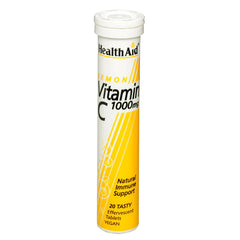Vitamin C Deficiency
Vitamin C deficiency, also known as scurvy, occurs when a person doesn't get enough Vitamin C in their diet for a long period of time.
Vitamin C or ascorbic acid is an essential nutrient that plays an important role in the body. It is necessary for the formation of collagen, which is a protein that supports the structure of skin, bones and blood vessels. Vitamin C acts as an antioxidant, which helps to protect cells from damage.
Symptoms of Vitamin C deficiency include:
- Fatigue
- Weakness
- Muscle and joint pain
- Swollen and bleeding gums
- Bruising easily
- Dry, scaly skin
- Slow wound healing
- Anaemia (a reduced number of red blood cells)
- Infections due to a weakened immune system
- Depression and mood changes
Having a severe Vitamin C deficiency for a long period of time can lead to more serious health problems, including gum disease, joint pain and internal bleeding.
Fruits and vegetables, especially citrus fruits (oranges, lemons, grapefruits), strawberries, kiwi, broccoli, brussels sprouts and bell peppers are good dietary sources of Vitamin C. To prevent Vitamin C deficiency, you should include these foods in your diet regularly.
If you think you have a Vitamin C deficiency, it's important to contact a healthcare professional for proper diagnosis and guidance on supplementation or dietary changes.
Vitamin C supplements are available over the counter and can be prescribed by a healthcare provider when necessary.

Benefits of Vitamin C
-
Antioxidant Properties: It is a powerful antioxidant that helps protect cells from damage caused by free radicals. Free radicals are molecules that can harm cells and contribute to ageing and various diseases, including cancer.
-
Immune System Support: Vitamin C is crucial for the function of the immune system. It helps stimulate the production of white blood cells, which are essential for fighting infections and illnesses.
-
Collagen Production: It is necessary for the synthesis of collagen, a protein that plays a role in the formation and repair of skin, blood vessels, tendons and ligaments. This makes vitamin C important for wound healing and maintaining healthy skin.
-
Wound Healing: Ascorbic Acid may help the body form new tissue and repair damaged tissue. It can accelerate the healing process of cuts, bruises and surgical incisions.
-
Cardiovascular Health: Some research suggests that it may help reduce the risk of heart disease or heart attack by improving blood vessel function. It helps reduce inflammation and manages high blood pressure.
-
Iron Absorption: Vitamin C helps the body absorb iron (the type of iron found in plant-based foods) in the intestines. This can be beneficial for individuals who follow vegetarian or vegan diets or those who have an iron deficiency.
-
Eye Health: Ascorbic Acid may reduce the risk of cataracts and age-related macular degeneration, which are eye conditions that can lead to vision problems.
-
Stress Reduction: It can help reduce the physical and mental effects of stress. It supports the adrenal glands, which produce stress hormones.
-
Allergy Relief: Some studies suggest that Vitamin C may help reduce allergy symptoms by acting as a natural antihistamine.
-
Skin Health: It is used in various skincare products as it is thought to brighten the skin, fade hyperpigmentation and protect against the harmful effects of UV radiation.
-
Collagen and Joint Health: Ascorbic Acid can support joint health by aiding in the formation of collagen in cartilage. This helps maintain joint flexibility and reduce the risk of conditions like osteoarthritis.
-
Respiratory Health: There is some evidence to suggest that it may reduce the duration and symptoms of the common cold and flu.
While Vitamin C supplements offer numerous health benefits, excessive, long-term intake can lead to side effects, including digestive issues.
The recommended daily intake of Vitamin C varies depending on factors like age, sex, and individual health needs.
NRV
Nutrient Reference Values (NRVs) are dietary recommendations set by health organisations to guide individuals on the intake of essential nutrients, including Vitamins and Minerals.
The NRV for Vitamin C, also known as the Recommended Dietary Allowance (RDA) or Recommended Dietary Intake (RDI), can vary slightly between different countries.
-
For adults, both men and women: 80milligrams (mg) per day
-
For pregnant women: 100mg per day
- For lactating women: 155mg per day
Vitamin C is water-soluble, which means it is not stored in the body and excess amounts are typically excreted in the urine, so it is hard to overdose.
Some individuals, such as smokers, may require higher Vitamin C intake due to increased oxidative stress. In such cases, healthcare providers may recommend high doses.
Vitamin C Effervescent Tablets
Effervescent tablets and normal tablets are two different forms of supplements. Each has its own set of advantages and disadvantages. Here are some benefits of effervescent tablets compared to normal tablets:

-
Faster Absorption: Effervescent tablets dissolve quickly in water. This can lead to faster absorption of the medication or supplement by the body compared to standard tablets, which may take longer to break down in the digestive system.
-
Easier to Swallow: Effervescent tablets are usually dissolved in a glass of water, making them easier to swallow than large standard tablets for people who have difficulty swallowing pills.
-
Better Taste: Effervescent tablets are often flavoured and can have a more pleasant taste compared to regular tablets, which may have a bitter or unpleasant taste. This encourages individuals to continue taking their supplements, especially in children or people who dislike taking pills.
-
Reduced Stomach Upset: Some medications or supplements can cause stomach irritation or discomfort. Effervescent tablets may be gentler on the stomach, as the active ingredients are already dissolved in a liquid when swallowed.
-
Hydration: Because effervescent tablets are dissolved in water, they can help with hydration, which can be particularly beneficial when taking medications or supplements that require increased fluid intake.
-
Dosage:
Effervescent tablets can be dissolved in different amounts of water to achieve different concentrations, so there is flexibility in dosage.
The choice between effervescent tablets and standard tablets depends on individual preferences, the specific medication or supplement and any dietary restrictions or health considerations. It's important to follow your healthcare provider's guidance and consult with them before making any changes to your medication or supplement regimen.
HealthAid Vitamin C Effervescent tablets are available in three delicious flavours, zesty orange, succulent blackcurrant and zingy lemon. They are a convenient and enjoyable way to boost your immune system, support collagen production for radiant skin and maintain overall health.
Simply drop a tablet into water, watch it fizz, and say goodbye to the hassle of swallowing pills.
 |
 |
 |
Related Articles
Sources
- 3 Science-backed Benefits of Vitamin C — Nutravita
- Vitamin C Deficiency Symptoms, Causes, How to Overcome It - Dr. Axe (draxe.com)
- Top 20 Vitamin C Foods, Benefits, Recipes and Supplements - Dr. Axe (draxe.com)
- Vitamin C - Mayo Clinic
- Vitamin C and Infections - PubMed (nih.gov)
- The Roles of Vitamin C in Skin Health - PubMed (nih.gov)
- Vitamin C - Health Professional Fact Sheet (nih.gov)
Images: Image by lookstudio on Freepik Image by upklyak on Freepik Image by Freepik
Any information or product suggested on this website is not intended to diagnose, treat, cure, or prevent any medical condition. Never disregard medical advice or delay in seeking it because of something you have read on this website. Consult your primary healthcare physician before using any supplements or making any changes to your regime.




